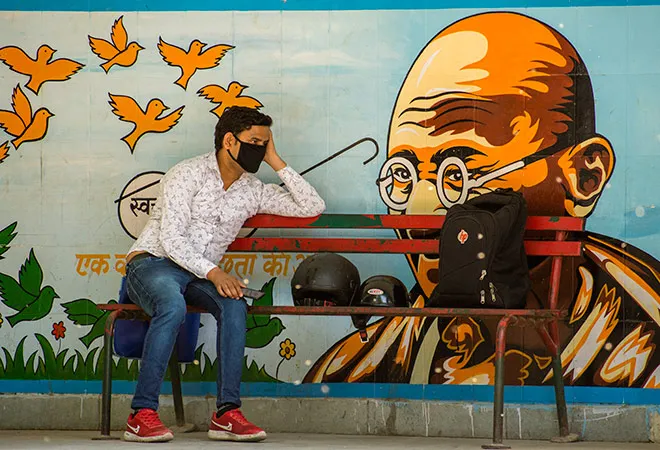
In the early hours of 14 April, as Prime Minister Narendra Modi officially declared the extension of the nationwide lockdown till 3 May in a bid to contain the bludgeoning spread of COVID-19 in the country, a story of suffering, hope and disappointment unfolded in the Bandra railway station in Mumbai. The story is about the hapless populace, the poor and vulnerable internal migrant daily workers who were desperate to get transportation to go back to their hometowns or villages. As their number increased the police used batons to disperse them. Their plight and sufferings have got people’s attention though it is not a new incident.
The migrant workers of mostly unorganised sectors started fleeing en masse as ‘long march’ from Delhi to their native villages after the announcement of the central government for complete lockdown which started since 24 March. During the initial phase of the lockdown, apart from Delhi, the movement was quiet significant from states like Maharastra, Tamil Nadu and Kerala, where the coronavirus has taken a substantial toll. Fear of starvation also pushed hundreds of migrant workers in Surat, Gujarat out on roads demanding salaries and transportation for going back to their villages. As the ensuing crisis have brought their marginalisation at the forefront, time is ripe to delve into the question of their constitutional rights of safe and secured life and state’s ethical duty to care for these migrants daily wage earners in this crisis situation as well as in a post COVID-19 socio-economic order.
The sudden loss of livelihood, imminent possibility of starvation and destitution, inability to reach the comfort of native home, unable to do the rabi crop harvesting back in their villages, antagonistic treatment from the administration, lack of proper food and lodging arrangement in the government sponsored shelters — all these constituted their suffering during this lockdown.
At the very outset, it is an imperative to underline what entailed the suffering, hope and disappointment of the migrant workers who gathered at Bandra station that day. The sudden loss of livelihood, imminent possibility of starvation and destitution, inability to reach the comfort of native home, unable to do the rabi crop harvesting back in their villages, antagonistic treatment from the administration, lack of proper food and lodging arrangement in the government sponsored shelters — all these constituted their suffering during this lockdown. The eternal wait for the end of the initial 21-days lockdown accumulated hope of home going for these migrants on 14 April which marked the last day of the first phase of lockdown. So, they thronged the station to avail the first train to their homes that would in some sense mark a modicum of comfort and familiarity for these migrant workers in such time of uncertainty. However, their hope soon relegated to disappointment as they confronted the fact that as the lockdown would continue, for all compelling reasons, no train would ferry them back home. In the second phase of the lockdown, their sufferings also would make an unavoidable extension for itself.
Dual imperative of ethical and constitutional care
As the threat of the contagion has engulfed the entire country, along with the rest of the world, the susceptibility of these poor and marginalised migrant workers to tremendous hardships is a glaring reminder of the inequality that has become a harsh reality in our everyday lives. For better economic opportunities, these migrant workers have to abandon their native homes in search for means of livelihood which brings them under extremely harsh and unfavourable circumstances. They are often engaged in menial jobs with meagre income and no social security as daily wage labourers, domestic help, rickshaw pullers and other vocations in the unknown urban conglomerations. To work and survive in those places without any job or social security, they manage under the strict eye of the administration and confront the hostile local populace who consider them as ‘outsiders’.
It has to be borne in mind that these migrant labourers who have hit the streets amid the lockdown are citizens with the legal right of having the freedom to move within the country to work (Article 19) and are entitled to social protection from the state.
These migrant workers often remain metaphorically as well as literally at the margins of the society working in unhealthy conditions and residing either in squalor slum colonies or even on roadside pavements of the cities they serve. They are subjected to suspicion and is perennially denied their basic rights which are constitutionally guaranteed to them. It has to be borne in mind that these migrant labourers who have hit the streets amid the lockdown are citizens with the legal right of having the freedom to move within the country to work (Article 19) and are entitled to social protection from the state. This mandates the state to not only safeguard their right to life (Article 21), but also right to a healthy and dignified life that these rights entail. However, in practice, their citizenship rights are confined to the mere legalistic entitlement without much access to the social and economic rights. This explains that how they have been denied the right to health as they were left on the roads susceptible to the virus and their right to dignity was compromised as they were stopped from returning to their homes.
State care and its inadequacy
However, this is not to argue that the present crisis is only witness to the insensitivity towards the sufferings of these migrants. As soon as the realisation dawned upon the state that sudden lockdown without prior notice have triggered such chaos and paranoia amongst these migrant workers in various states, certain measures were taken by the state governments to arrest the crisis. First, the states made certain travel arrangements to carry some sections of the migrants from their host states to the native states. Second, the host states have also made quick arrangement for the lodging and food for these migrant workers during the course of the lockdown in order to save them from starvation. In both these initiatives, the state governments led by the respective chief ministers commendably coordinated amongst themselves to ensure the safety and survival of the migrant workers of their states. Reports also suggest that the states are also making attempts to deliver cash to their migrant populations through direct benefit transfer schemes under the advice of the centre. The Union Home Minister Amit Shah also has reiterated the centre’s commitment towards “all support to migrant workers during the lockdown period.” But the relief measures on ground seem to be seriously inadequate that questions the state’s ethical and constitutional promise of care giving to this hapless population. Yamini Aiyar in her article states that “data collected from 11,000 distressed workers across the country by the Stranded Workers Action Network (SWAN), a group of volunteers working to provide relief, reports that by the third week of the lockdown, 50% of (migrant) workers had less than one day’s worth of rations. More worrying, 96% had not received rations from the government while 70% had not received any cooked food.” So, it can’t be ruled out that the possibility of hunger in the relief camps and the “fear of dying alone” might again push the migrants to make attempts to return home in the course of the lockdown.
The need for an assuring state
Under such circumstances, the imperative of a caring state which has to shade its demeanour of negligence and replace it with trust and compassion, is the need of the hour. On that end, the conduct of the ethical care giving state must be premised on the new “politics of responsibility” towards these vulnerable migrant workers. Such responsibility must entail the providence of a safe and healthy survival at the present and an assurance of an economically secured future. First, the securing of lives of these helpless sections of the citizenry must be of paramount importance. For that, the respective host states will have to provide adequate shelter in accordance with the existing social distancing norms for the migrant workers. Apart from that, as the above report suggests that the food distribution implementation on the ground level is replete with glitches which need to be immediately checked. For that purpose, expansion of the Public Distribution System (PDS) in extremely crucial in order to ensure that these menial migrant workers who might not always have ration cards due to their lack of domicile proof in the host states, should be issued temporary cards for availing those benefits.
Respective host states will have to provide adequate shelter in accordance with the existing social distancing norms for the migrant workers.
For the states which are not in a strong position to host the migrant workers should make safe arrangements for their return to their native places. In the process of their inter-state transportation, their Aadhaar details can be used for keeping a track on their native location. It also has to be ensured that their COVID-19 testing and adequate quarantine measures are undertaken at the local levels to ensure their health safety as well as safety of their community once they reach their native places. Second, once the present contingency situation is handled with care and their physical well being is ensured, adequate economic relief measures and employment opportunities have to be guaranteed to these already economically weak sections who are staring at joblessness after the lockdown.
These migrant workers have perennially remained at the socio-economic margins of our society silently serving as the instrumental labour force of the urban economies, languishing in discriminatory invisibility. This crisis has brought them into the visibility of the state’s gaze. So, the time is ripe for the state to exercise its true responsibility of guaranteeing the right to dignified life, understandably in a limited manner, to these migrant workers.
The views expressed above belong to the author(s). ORF research and analyses now available on Telegram! Click here to access our curated content — blogs, longforms and interviews.




 PREV
PREV



